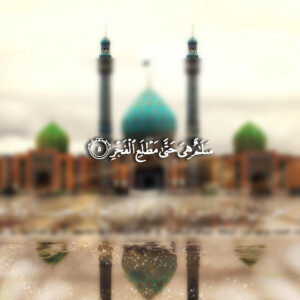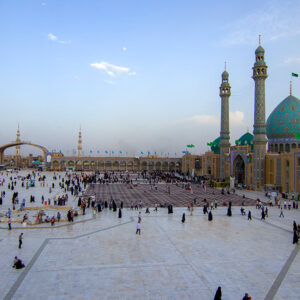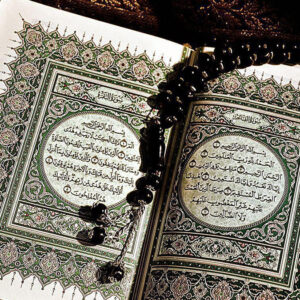أَمَّن يُجِيبُ الْمُضْطَرَّ إِذَا دَعَاهُ وَيَكْشِفُ السُّوءَ وَيَجْعَلُكُمْ خُلَفَاء الْأَرْضِ أَإِلَهٌ مَّعَ اللَّهِ قَلِيلًا مَّا تَذَكَّرُونَ
“Is not He (best) who answers the distressed when he calls to Him, and removes the distress and makes you the successors in the earth”
Imam Sadiq (as) said, When the Qaem (as) rises, he will enter Masjid Al-Haram. He will face the Kaabah, and his back will be toward Maqam of Ibrahim. He will perform two units of prayer there.
Then he will say, “O people! I am the closest to Adam (as). I am the closest to Ibrahim (as). I am the closest to Ismail (as). I am the closest to Mohammed (sawa).
Then he will raise his hands toward the sky and pray humbly to Allah, beseeching Him (so much) that he will fall on his face. This is the meaning of the words of Allah, “Is not He (best) who answers the distressed when he calls to Him, and removes the distress and makes you the successors in the earth” (Chapter 27 verse 62) (Taweel Al Ayat Al Zahirah page 399)
Imam Baqir (as) explained the above verse by saying, “This verse was revealed about the Qaem of the family of Mohammad (sawa). When he rises, he will wear a turban and he will pray by the Maqaam of Ibrahim. Then he will beseech his Lord and his prayers will be answered. (Taweel Al Ayat Al Zahirah page 399)
Imam Sadiq (as) said, The verse, “Is not He (best) who answers the distressed when he calls to Him, and removes the distress and makes you the successors in the earth” (Chapter 27 verse 62) was revealed about the Qaem of the family of Mohammed (sawa)
I swear to Allah that he is “the distressed” who will perform two units of prayer by Maqaam of Ibrahim and then will beseech Allah. Allah will answer his prayers and will remove the distress and make him (the Qaem (as)) the successor in the earth. (Tafseer Al Qummi volume 2 page 129)
Imam Baqir (as) said, “The Owner of this Matter (the Twelfth Imam (as)) will be in hiding in one of these lands,” and he pointed toward Zee Tuwa.
The Imam (as) continued, Two nights prior to his rising, his servant will come and meet some of his companions.
He will ask them, “How many men are you here?” “About forty,” they will reply.
“How (obedient) will you be when you meet your master?” he will ask.
“We swear to Allah we would go anywhere with him, even to the mountains,” they will reply.
The next night, (the servant of the Twelfth Imam-) will return and will order them to appoint ten of their best men. After they select their best men, he will take them to their master (the Twelfth Imam (as))- He (the Qaem (as)) will promise them that the next day will be the day of his reappearance.
Imam Baqir (as) continued, I swear to Allah that it is as if I can see the Qaem (as) with his back resting on Hajar, calling out,
O people! Those who dispute with me about Allah, (should know) that I am the most knowledgeable about Allah.
O people! Those who dispute with me about Adam, (should know) that I am the most knowledgeable about Adam (as).
O people! Those who dispute with me about Nuh, (should know) that I am the most knowledgeable about Nuh (as).
O people! Those who dispute with me about Ibrahim, (should know) that I am the most knowledgeable about Ibrahim (as).
O people! Those who dispute with me about Musa, (should know) that I am the most knowledgeable about Musa (as).
O people! Those who dispute with me about Isa, (should know) that I am the most knowledgeable about Isa (as).
O people! Those who dispute with me about Mohammed, (should know) that I am the most knowledgeable about the Messenger of Allah (sawa).
O people! Those who dispute with me about the Book of Allah, (should know) that I am the most knowledgeable about the Book of Allah.
Then he will move to the Maqaam where he will perform two units of prayer and will ask Allah to grant him his rights.
Imam Baqir (as) added, I swear to Allah that he (the Twelfth Imam (as)) is the “distressed” to whom this verse refers, “Is not He (best) who answers the distressed when he calls to Him, and removes the distress and makes you the successors in the earth” (Al Ghaybah by Nomani page 95)
- Read More: Mahdi in the Quran









